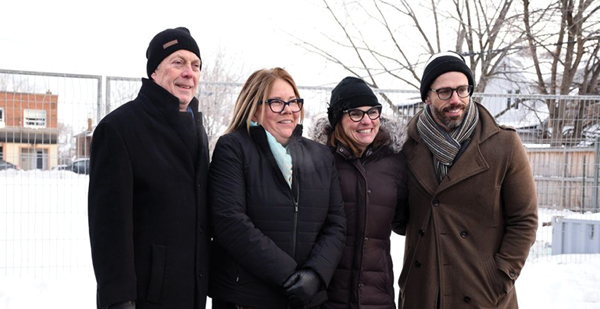Member Experience: Navigating the National Housing Co-Investment Fund

The YWCA Hamilton recently received a $10 million federal commitment for their Ottawa Street project, making them the first organization in Ontario to be approved for funding through the National Housing Co-Investment (NHCIF) – New Construction Stream. The $15.9 billion NHCIF is a pillar of Canada’s National Housing Strategy, and the New Construction Stream aims to create up to 60,000 new affordable homes.
Besides being the first approved project through this stream of the NHCIF, Ottawa Street is unique in other ways as well. Even before its doors open in 2020, the project is breaking barriers with a women-led team, including an architectural unit made up of five women and one man – an uncommon gender balance in the industry.
The team’s structure inadvertently reinforces the project’s social mission, which is centered on supporting women. Ottawa Street will provide 50 units (35 of which will be rented at less than 75 per cent of the median market rent) for women and their families, and will also include a seniors centre and other much-needed community spaces.

On top of the $10 million from the NHCIF, the $22 million project is made up of approximately $5.25 million from the Investment in Affordable Housing for Ontario (IAH) program and Social Infrastructure Fund (SIF), $1 million in development waivers from the city, a mortgage, and a plan to fundraise the remainder.
As the “guinea pigs” of the co-investment fund application process, the team at the YWCA Hamilton have valuable insights to share with ONPHA members.
We spoke with Medora Uppal, Director of Operations, about the team’s experience so far.
Getting Started
Initially, the team were in talks with the Canada Mortgage and Housing Corporation (CMHC) to apply for the Innovation Fund, a separate program under the National Housing Strategy. However, they were encouraged to wait for the launch of the co-investment fund, as it seemed like a better fit and includes an option for a grant/loan component. So by the time the NHCIF was announced, the team was already connected with CMHC and ready to hit the ground running. They also had two key pieces in place towards signing an agreement: the land and a co-funder.
Even still, the process was long, says Uppal. They were one of the first in the country to submit an application in May of 2018, and it took until December to get confirmation that they were successful.
While it was helpful to be quite far along in the process before starting an application, Uppal says that it’s worth having a conversation with your regional CMHC rep at any stage: “Even if you’re not exactly sure what you want, but you have an idea or an opportunity, CMHC can be a support. There’s no risk in giving them a call.”

Vigorous Scoring Process
One of the major steps in the application process is scoring. This system is used to determine the funding eligibility of a project. After reviewing the requirements, Uppal says the team was confident they would score high in every area – except one.
“The scoring is really vigorous,” she says. “The area we were scoring lower in was the environmental component, and that’s because passive house didn’t quite fit into the modelling they were using.”
With its passive house design, the Ottawa Street project will achieve energy savings of 75 per cent and a reduction in greenhouse gas emissions. Despite this, the team’s score still dipped in this category. However, CMHC has since introduced new flexibilities, including accepting passive house planning as a modelling software for energy efficiency requirements.
Overall, Uppal says CMHC was willing to hear their concerns, and there was an understanding that it was as much of a learning process for them as it was for the applicants.
“We did hit some challenging points along the way, where [CMHC] had to look at the rules and see where they made sense or where exceptions can be made,” she say. “The open dialogue really helped.”
Team Work Makes the Dream Work
Keeping the team organized is essential for success, says Uppal. The YWCA Hamilton brought on a development consultant,and their internal team members have a breadth of knowledge and expertise.
But even with an experienced team, Uppal says it’s been a challenge to be one of the first to navigate the co-investment fund and puzzle all of the moving pieces together between various levels of government. There’s one set of deadlines attached to the co-investment fund, and different timelines to meet with the other funding sources, such as the IAH and SIF programs.
“While we were on a call, we’d have emails flowing in with new information. You’d get off the call having resolved one issue, only to have a whole new set of issues coming at you,” says Uppal. “It was consistently like that.”
Committing to weekly update meetings and keeping all parties in the loop at all times helped them stay on track.
“Copy everyone on every communication,” says Uppal. “If someone misses a piece of information, you’ll have to backtrack and catch people up which is time consuming, and timelines are already very pressured.”
They found additional support by reaching out to other non-profit housing organizations who are also going through the process.
“It’s good to just bounce ideas off of one other,” says Uppal. “If you all have different reps from CMHC, they’re coming to different solutions at different times. As non-profit housing providers, it’s helpful to come together to talk and see what solutions other people are coming up with.”

Tenacity & Commitment
Even with the confirmation of contributions, there’s still several milestones left to hit for the Ottawa Street project, including obtaining a building permit and running a successful fundraising campaign. It’s a long process that’s not for the faint of heart, says Uppal.
“When you get to the point where you know you’re going to go for it, make sure you have a very clear vision and a strong commitment from the board and all those involved,” says Uppal.
“If you’re only contemplative about it, it will be too hard to get through. You’ll hit plenty of roadblocks. You have to have the tenacity, the commitment, and the will to move through them.”
So how has the team stayed motivated throughout the long and challenging process?
“We can see every day through our front doors the women coming in and out of our programs who are homeless, without any options, and are living in the most dangerous of situations,” Uppal says. “When that’s in your face every day, and when you have people setting up makeshift homes around your building just to survive, it’s easy to see how absolutely needed this project is.”
Learn More
Follow the YWCA Hamilton’s Ottawa Street project by signing up for updates.
Find out more about the National Housing Co-Investment Fund and application process. ONPHA continues to encourage interested members to connect with your regional CMHC rep to discuss your options and unique situation.
Members can also get in touch with us at member.support@onpha.org.
Interested in Development?
If you’re currently thinking about or in the process of new development or redevelopment, consider registering for ONPHA’s upcoming two-day in-person course Ready, Set, (Re)Build, happening May 27 and 28 in Toronto. You’ll walk away with a deeper understanding of the development process from start to finish.





